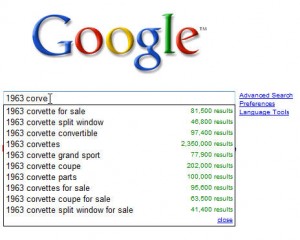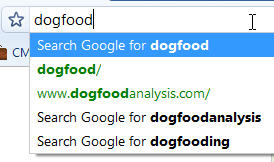The power Google has by virtue of their position is amazing. Consider two recent announcements from the ‘plex:
- Google Suggest is now a default feature of Google.com. The impact here could be that people stop typing long detailed search phrases and instead just take one of the suggestions. The worry is that this ‘cuts off’ the long tail and will increase competition for those suggestion phrases. Read this for an in-depth analysis.

- Google Chrome munges the address and search boxes together so that you’re in effect encouraged to search and not type-in the URL. This drives more and more traffic through search, which places a premium on both your organic and paid results. It also hastens the trend to not bother remembering or bookmarking URLS because ‘it’s easier just to search’.

While both features are genuinely user-friendly in terms of Google enhancing the experience of people browsing the web, they both also happen to drive more money from advertiser pockets into the Google coffers.
Google Suggest will (I predict) lengthen what we call the ‘search chain’ – the number of different searches you do before you find what you’re looking for. Folks who had been searching on increasingly long phrases will be suckered into trying the shorter suggests, only to later go back and do the long search anyway at least for that large percentage of the time that the more generic searches yield interesting but unsatisfactory results.
Google Chrome’s search/address box will just increase search volume. Once they bundle Suggest in Chrome, then both search volume will increase and the number of queries per chain will increase. Another 1-2 punch for quarterly profits.
What Can PPC Advertisers Do?
Nothing to stop the features or trends. But what both demand is a strong need to know exactly what search queries users are typing, and how these queries are being matched to the keywords you’re bidding on.
If there is a new concentration of traffic from Google Suggest, only search query analysis will reveal it, as your various keywords and match type combinations will not make these trends visible to you.
If Chrome drives more search volume, that’s good. But if you want to know how it drove that traffic, again you need to be able to analyze search queries.
Keep An Eye On Search Queries
Search queries are the unfiltered driver of your traffic and your search spend. A keyword-centric view of PPC obscures this truth behind an matrix of keywords, match types, bids and quality scores that all combine and conspire in rather complicated ways to determine which keywords get the clicks and how much those clicks cost.
If you know which queries are driving your costs and revenue, you can better organize, select, and bid on keywords. Knowing them however, isn’t easy, as Adwords reports only a percentage of them and not at a keyword level. Yahoo and MSN, however, report no queries at all.
In ClickEquations we report all queries, and show exactly which keyword attracted each one, and which conversions resulted. It’s just one of many things we did differently because our years managing paid search accounts gave us a unique perspective on what a paid search tool should do.
ClickEquations isn’t available, hasn’t even really been announced, but we’re now accepting invitations for free ‘charter’ accounts. Wanna give it a try?



